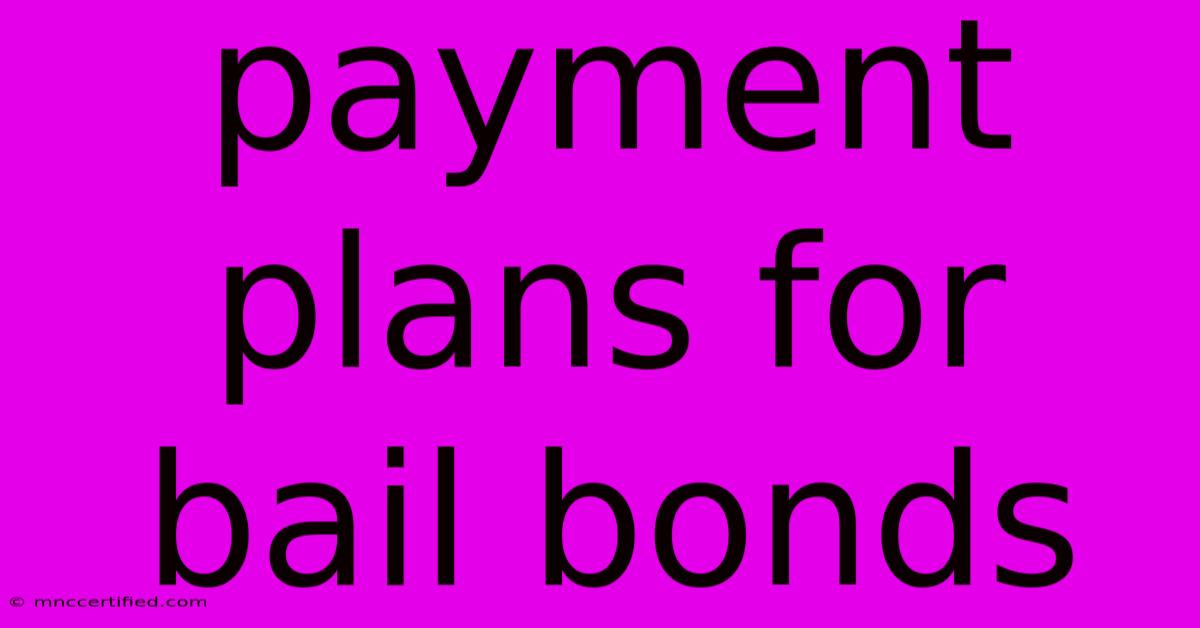Payment Plans For Bail Bonds

Table of Contents
Payment Plans for Bail Bonds: Navigating Your Options
Getting arrested and facing bail can be a stressful and confusing experience. One of the immediate concerns is how to afford the bail amount, which can often be substantial. This is where bail bondsmen step in, offering a crucial service: securing your release by paying a percentage of the bail amount. However, even the percentage required can be a significant financial burden. Fortunately, many bail bonds companies understand this and offer payment plans for bail bonds. This article will guide you through understanding these plans and making informed decisions.
Understanding Bail Bonds and Payment Options
A bail bond is a contract between a defendant, a bail bondsman, and the court. The bondsman posts bail, allowing the defendant's release pending trial. In return, the defendant pays a non-refundable fee, typically 10-15% of the total bail amount. This fee covers the bondsman's services and risk.
Crucially, many bail bonds companies offer flexible payment arrangements to ease the financial strain on their clients. These bail bond payment plans can vary greatly, so it's vital to understand the options available and choose the one that best suits your circumstances.
Types of Payment Plans for Bail Bonds
While the specifics will differ between bail bonds companies, common payment plan structures include:
-
Short-Term Payment Plans: These plans typically involve paying off the bond fee within a few weeks or months, often through weekly or bi-weekly installments. This is suitable for those who anticipate receiving funds soon, such as through a pending paycheck or insurance claim.
-
Long-Term Payment Plans: These plans extend the repayment period over a longer duration, potentially several months or even a year. This offers greater flexibility but may involve higher overall interest charges or fees.
-
Negotiated Payment Plans: Some bail bonds companies are willing to negotiate customized payment plans based on individual financial situations. Open communication with the bondsman is crucial in securing a plan that works.
-
Secured Payment Plans: These plans may require collateral, such as a vehicle title or other valuable asset, to secure the payment agreement. This can be beneficial if your credit history is less than ideal.
Factors Affecting Your Payment Plan Options
Several factors can influence the type of payment plan offered and its terms:
-
Bail Amount: Larger bail amounts typically necessitate more extensive payment plans, potentially with longer repayment periods.
-
Credit History: A poor credit history might limit your options and lead to stricter terms.
-
Income and Employment: Stable income and employment demonstrate your ability to repay the bond, increasing your chances of approval for a favorable payment plan.
-
Assets: Owning assets can be used as collateral to secure a payment plan, making it easier to obtain approval even with lower income.
-
Bail Bonds Company: Different companies have different policies regarding payment plans. Shopping around and comparing options from multiple companies is crucial.
Choosing the Right Payment Plan
Selecting the right bail bond payment plan requires careful consideration. Here are some tips:
-
Shop Around: Compare offers from multiple bail bonds companies before making a decision. This allows you to find the most favorable terms and interest rates.
-
Understand the Terms: Read the contract carefully and ensure you fully understand all fees, interest rates, and payment schedules. Don't hesitate to ask questions if anything is unclear.
-
Be Honest: Transparency with the bail bondsman about your financial situation is essential to securing a workable agreement.
-
Budget Accordingly: Create a realistic budget to ensure you can comfortably make your payments without jeopardizing other financial obligations.
Avoiding Scams and Protecting Yourself
Be wary of companies offering unrealistically favorable terms or pressuring you into immediate decisions. Legitimate bail bond companies will provide clear, transparent information and work with you to find a suitable payment plan. Always verify the legitimacy of the bail bonds company before engaging with them.
Conclusion
Securing a release from jail through a bail bond often requires careful financial planning. However, the availability of payment plans for bail bonds provides much-needed flexibility. By understanding your options, comparing offers, and communicating honestly with the bail bondsman, you can navigate this challenging situation and create a payment plan that works for your circumstances. Remember, responsible financial planning and open communication are key to a successful outcome.

Thank you for visiting our website wich cover about Payment Plans For Bail Bonds. We hope the information provided has been useful to you. Feel free to contact us if you have any questions or need further assistance. See you next time and dont miss to bookmark.
Featured Posts
-
Sheffield United Vs Sunderland Channel
Nov 30, 2024
-
Lux Bond And Green Westport
Nov 30, 2024
-
Hunter Stat Inflation Colorado Faces Accusations
Nov 30, 2024
-
Black Friday Sale Ends Soon
Nov 30, 2024
-
Coronation Street Les Battersby Murder Mystery Solved
Nov 30, 2024